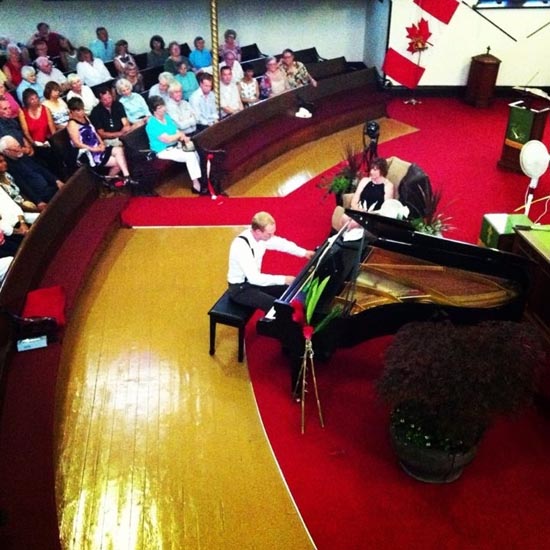
Part way through B.J. Byers’ concert last Saturday night in Uxbridge, the young pianist finished one of his toughest pieces – an etude by Chopin. He wiped the perspiration from his face with a towel, smiled broadly – as if he had just conquered Everest – and acknowledged the packed house at Trinity United Church.
“There was once a time, I wouldn’t have been able to face this,” Byers said. “I would have just turned and run away.”
For much of the past 15 years, B.J. has doubled as a hard-working young man in the service industry (bartending and hosting at his parents’ Hobby Horse Arms restaurant in Uxbridge) and aspiring pianist. As he pointed out in a recent interview, when he was 18, he put on a similar show. But his performance back then was practical – a means of raising funds for his university books and of readying himself for post-secondary courses at the U of T. B.J. is a contemporary of our daughter, jazz singer Whitney Ross-Barris; in fact, B.J. has accompanied Whitney for several of her shows in town, not to mention others who came to depend on the strength of his range and personality at the keys. In part, that sparked his concert last Saturday night.
“I’ve always played as a guest at someone else’s concert,” he said.
On the eve of Canada’s 146th birthday, it occurs to me that perhaps this nation needs to think the way B.J. Byers now does. It may be time for Canada to face certain issues more as a soloist and less as an accompanist. The country – with 10 provinces and three burgeoning territories (Yukon appears to have provincial aspirations) and nearly than 35 million people – may need to focus on approaches to governance and law, tolerance and equity, as well as economic, social justice and environment issues, in a more definitive and solo fashion, not such an accompanying one.
Maybe Canadian leadership needs to be more confident, braver and more self-assured in principles we have developed and learned to espouse since the birth of the Canadian confederation in 1867.
Back then, Sir John A. Macdonald, talked about Canada realizing a “national dream.” Later, Sir Wilfrid Laurier said, “Canada shall fill the 20th century.” Eventually, her crucibles – the battle at Vimy Ridge in the Great War and the formation of the United Nations at end of the Second World War – appeared to give Canada and her citizens “nationhood” and “a place among nations” respectively.
But as the 21st century moves through the 20-teens, pride in battlefield accomplishments and innovation at peace tables may well be behind us. Perhaps it’s time for some of our less obvious principles and philosophies to become our calling cards.
The current federal administration seems to indulge in Schadenfreude by telling the European Community how it should run its banks and balance its budgets. I consider that more puffing-of-chest than offering a practical way through. If we as Canadians believe so strongly in universal Medicare, tolerance of diverse cultures, strategies for coping with global warming, and yes, unique methods for solving international confrontations with more talk and less testosterone, for example, maybe it’s time our leaders said so.
If politicians thought less about getting elected and more about what Canada and Canadians can offer the world, imagine the energy, innovation and improvement that might unleash.
As a person with some 60-plus years of life as a Canadian behind me, I think of pride in my country via such events as Expo 67, the Montreal, Calgary and Vancouver Olympics, and yes, of our decision to stay out of Iraq, but to go into Afghanistan.
But I also think of real leadership in Canadians such as populist Tommy Douglas, suffragette Agnes Macphail, physician Wilder Penfield, runner Terry Fox, journalist June Callwood, astronaut Chris Hadfield, judge Louise Arbour, diplomat Ken Taylor and yes, for his belief in self-determination, even Rene Lesvesque. Their leadership was not inspired by a desire for notoriety or monetary gain. They simply excelled in what they believed in, and as a consequence, the country, indeed much of the world, has paid attention and even emulated.
Last week, pianist B.J. Byers also commented that his June 22 concert was “my first concert as an adult.” B.J.’s stellar performance, his sense of having arrived and his gift to his friends and loving family I think helped him realize that plateau in his life.
Perhaps this country, on the verge of its 150th anniversary in 2017, is about to become an adult. It has dealt with birth and acknowledgment, coming of age in nationhood, and even acceptance on the world stage in century of hot and cold wars. Perhaps now, with young people (much like accomplished and confident B.J. Byers) soon to be at Canada’s helm, it’s time to enter adulthood and maturity.